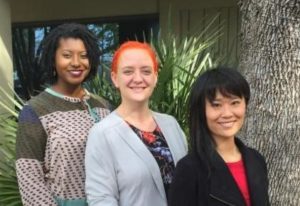TRANSPARENCIES
A monthly newsletter from Integral Care.
A monthly newsletter from Integral Care.

A Message From Our CEO
“Whether an illness affects your heart, your leg, or your brain, it’s still an illness, and there should be no distinction.” – Former First Lady, Michelle Obama
February marks African American History Month, a time to celebrate the accomplishments and contributions made by African Americans throughout history and today. It is also an opportunity to reflect on the challenges this community faces regarding mental health issues and healthcare access.
According to the Health and Human Services Office of Minority Health, African Americans are 20% more likely to experience serious mental health issues than the general population. Common mental health disorders among African Americans include major depression, attention deficit hyperactivity disorder (ADHD), posttraumatic stress disorder (PTSD), and suicide among young African American men. The American Psychological Association states that racism and racial discrimination create a unique environment of pervasive, additional stress for people of racial and ethnic minorities in the United States. Studies find that race-related stress is associated with the development of lifetime depressive and mood disorders.
Historically, African Americans have also experienced prejudice and discrimination in the mental health care system. Due to these barriers, the African American community has traditionally relied on family, community and faith for support, rather than consulting healthcare professionals. As the system grows in cultural competency – respectfulness and responsiveness towards an individual’s health beliefs, practices, preferences and needs – barriers are breaking down.
With an increased focus on spreading awareness and cultural competency, a positive shift in services is happening. As part of the person-centered care we offer, Integral Care has made cultural competency a priority for our staff by implementing a program which provides tools to approach diverse cultural identities with an informed and positive attitude.
Texas House Representative Garnet Coleman, a prominent leader in the African American community and champion for mental health, made many considerable strides in mental health this last legislative session. The Sandra Bland Act was his number one priority, and as passed, ensures improvements to inmate safety, investigation of jail deaths, and an overall effort to help divert people suffering from mental illness or substance abuse out of the criminal justice system and into treatment. Representative Coleman also addressed mental health in our state by helping pass a total of $92.5 million to fund community collaboratives, designed to help people suffering from mental illness or substance abuse exit the criminal justice system and transition to treatment. He also helped author legislation aimed at fighting the opioid crisis, extending postpartum depression coverage, and expanding access to care.
This month, Integral Care hosts The 18th Annual Central Texas African American Family Support Conference, providing opportunities to learn about mental health, intellectual and developmental disabilities, substance use disorder and co-occurring disorders. Conference participants gain awareness of available healthcare services and much more.
With the support of the local mental health community, key legislators, a cultural shift in openly addressing mental health and increased cultural competency we can continue to build a strong network of mental health supports for individuals who may have faced healthcare disparities and discrimination in the past.

David Evans
Chief Executive Officer
Central Texas African American Family Support Conference Committee
For 18 years, Integral Care and the Central Texas African American Family Support Conference (CTAAFSC) Committee have partnered to organize this yearly event, aimed at bringing the community, professionals, clients and their family members together to increase awareness of mental health and available services.
 The Committee plays a special role in programming the conference, determining the goals each year and assisting with the solicitation and selection of presenters and speakers. The Committee is made up of volunteers who are affiliated with a wide spectrum of organizations and entities across Central Texas. Members hail from Texas Health and Human Services, the consumer-run non-profit Austin Area Mental Health Consumers, Texas Department of Insurance, Austin Public Health, healthcare management company Envolve Health, Texas Department of Family and Protective Services, Texas CASA, Texas Juvenile Justice Department, Travis County Health and Human Services, Dell Medical School and Austin Independent School District. Members also include a cultural competency consultant, community mental health professionals, pastors, clients and client family members.
The Committee plays a special role in programming the conference, determining the goals each year and assisting with the solicitation and selection of presenters and speakers. The Committee is made up of volunteers who are affiliated with a wide spectrum of organizations and entities across Central Texas. Members hail from Texas Health and Human Services, the consumer-run non-profit Austin Area Mental Health Consumers, Texas Department of Insurance, Austin Public Health, healthcare management company Envolve Health, Texas Department of Family and Protective Services, Texas CASA, Texas Juvenile Justice Department, Travis County Health and Human Services, Dell Medical School and Austin Independent School District. Members also include a cultural competency consultant, community mental health professionals, pastors, clients and client family members.
Vicky Coffee, Program Manager for the Hogg Foundation for Mental Health and committee member, has been involved since the inception of the conference. Prior to the first conference, Vicky worked for Integral Care as a clinician, where she saw the African American community hesitant to reach out and access services. She says,
“I saw the conference as a wake-up call for the African American community and I wanted to be a part of that charge.”
18 years later, she sees the difference this conference makes in the community.
“Each year, seeing so many new faces attend, and leave with resources, knowledge and hope they didn’t have before reinvigorates me and reminds me why I do this work.”
Vicky will emcee this year’s event, to be held February 27-28 at the Palmer Event Center. If you are interested in attending or sponsoring, click here.
Integral Care is grateful to Vicky and the wonderful mix of people on the CTAAFSC Committee who are invested in seeing parity in mental healthcare and the decline of stigma around mental health in the community. Thank you all for your service to the community.
Cultural Competency Program
In support of Travis County’s diverse and steadily growing population, all Integral Care staff are required to participate in our Learning and Development Team’s cultural competency program. Sensitivity and responsiveness towards a person’s cultural identity is at the heart of person-centered, trauma-informed care and a significant strategy for reducing healthcare disparities. Important factors that shape a person’s cultural identity are race, ethnicity, gender, religion, disability, and language.

With the help of our Cultural Competency team – Molly Wang, Denisha Jenkins and Jessica Pedrick – Integral Care aims to meet National Culturally and Linguistically Appropriate Services (CLAS) Standards. The Standards are federal guidelines with the goal of obtaining health equity. They provide the framework for all health organizations to best serve the nation’s diverse communities.
Integral Care sharpened its focus on cultural competency in 2012, with a successful application for the Cultural Competency Care project grant, through the 1115 waiver. The grant allowed our team to develop a 2-day foundational course in values and best practices tailored for staff who work in community healthcare, rolled out in January 2015. The foundational course ensures a strong understanding of the impact of social determinants of health and the impact of historical discrimination on current health outcomes. Now, in addition to the foundational course, our team is offering workshops that take a deeper dive into specific topics. Workshop topics in 2017 included: stereotypes around sex, gender, gender expression and sexual orientation; military culture; deaf culture (led by a Certified Deaf Interpreter); and age, generational differences, and how a client’s age can affect service delivery.
Project Lead Molly Wang says, “An important part of providing clients what they actually need to succeed comes from staff first knowing their own cultural identity and recognizing their own possible biases.” Thanks to Molly, Jessica and Denisha, for helping to keep Integral Care staff culturally competent.